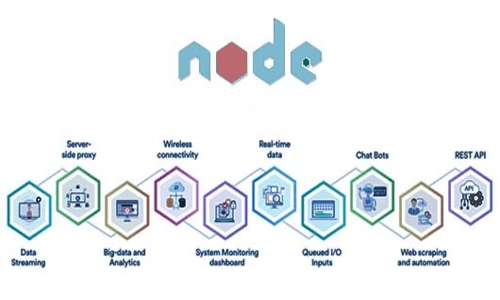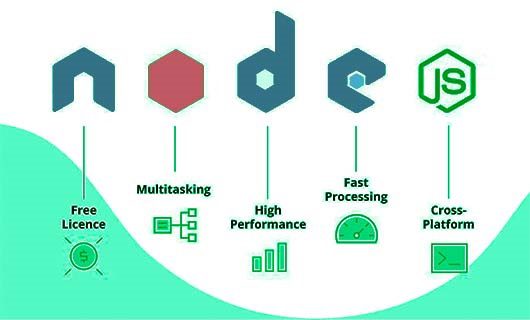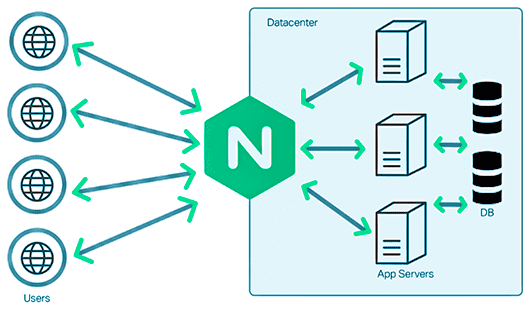Node.js is not actually a framework or a library, but a special operating environment in JavaScript.
The technology was first introduced in 2009 by Ryan Dahl and was immediately recognized as “the most exciting program in JavaScript’s current world”.
Now; JavaScript has the ability to do things that other scripting languages can do, such as Python (languages designed to carry out tasks to control the built application and treated using the interpreter interpreter rather than the compiler).

What is Node.js?
Node.js is a platform built on JavaScript runtime in Chrome to build fast and easily scalable network applications.
Node.js is also defined as an open source operating environment that works across platforms to develop server and network applications.
Node.js apps are written in JavaScript, and can be run during Node.js runtime on OS, Windows and Linux.
This is done in Chrome browser using V8 operating engine (open source drive written in++ C). Each browser has its own engine, which is the same engine used by Node.js.
Uses of Node.js
The Nodejs are used to program web applications specifically and websites, generally based on the event. so anything made on the server launches non-blocking event.
It means that the site or app cannot delay the execution of the event even if it enters the website. It might be also too used by thousands of users at the same time, because the Node js working environment is programmed to be Non-Blocking. The orders are executed in parallel.
Unlike PHP, orders are not executed except for the execution of the foregoing orders. This is the biggest difference between PHP & Node.js. And this is why node is distinguished and the reason for its terrible speed in executing orders.
Where can I use Node.js?
Below are the areas where Node.js proves itself as an ideal technical partner:
- I/O binding applications.
- Data Streaming Applications.
- Data Intensive Real-time Applications.
- JSON APIs based applications.
- One-page applications.
Node.js is not recommended for CPU-intensive applications.
Setting Environment Node.js
In order to set up your environment for Node.js, you need the following two programs available on your computer:
- Text Editor.
- Node.js binary fixations.
Node.js Features
Here are some important features that make Node.js the first choice for software engineers and developers.

1. Develop apps and sites faster
Using Google’s V8 engine, Node.js allows smart assembly of JavaScript in the original device code. This in turn ensures an accelerated development process. Given the fact that Node js is event driven and tracking a non-prohibited input/output model, it becomes perfectly suited for both real-time based applications as well as using data in memory across a range of devices.
Thus, using Node.js, developers can perform enormous processes of common tasks such as writing or reading on the database and network connections as well as file systems at high speed. It is distinctive that it allows the programmer to operate with parallel contacts with greater productivity.
LinkedIn, one of the world’s largest professional networks, has seen a significant increase especially with regard to mobile traffic and the number of servers that have fallen considerably from thirty to three after they have resorted to using Node.js.
2. Perfect choice for real-time application development
It is undeniable that the majority of companies these days are increasingly looking to work with real-time data. Using Node.js, it has become possible to create web apps that operate taking into account the information generated in real time.
It’s as simple as creating a blog using PHP. Also, Node Js can efficiently handle multiple functions for users by resorting to an event loop which in turn uses a WebSocket protocol that works on TCP. More than that, it also helps alleviate any HTTP burden directed towards web development.
3. Data flow
Unlike what many think, response and HTTP requests are not separate events. They are real-time data streams.
With Node.Js in the picture, it has become possible to process files during download.
In other words, Node.js has made it possible to save time that could have been lost when processing comprehensive data in the form of streams. It is almost similar in case of real-time recording of audio and video files as well.
4. Developers can use JavaScript for the whole project
This is one of the most obvious benefits of developing a web application using Node.js. JavaScript is a language to know for web development. Whether you create a multi-page or one-page app, you need to know JS well. If you’re already comfortable with JavaScript, learning Node.js won’t be a problem. Linguistic composition, basic functions and structural principles – all these things are similar.
If you have Java Script developers on your team, it will be easier for them to learn JS-based Node than to learn a brand new language. Moreover, the front and rear database will be very similar and easy to read and maintain – because both depend on JS.
By working within the Node.js environment, web developers can easily sync data between server and client. As such, both sides will be aware of any changes.
It is one of these platforms that meets everything you may need, such as the clarity of information for both sides in this case. No wonder Node.js has been able to attract such big companies to use in their interactive platforms.
5. Node.js can act as proxy server
Being a proxy server for a range of services that experience different response times makes Node.Js the perfect choice. Thus, it helps in the easy collection of data coming from several different sources.

Let’s illustrate this with an example. Any company that operates a server-side application and aims to communicate directly with third party resources, collect and store data in general uses dedicated servers. With Node.js, they have a better choice for all infrastructure that doesn’t exist or when one looks at local development.
6. Node.js gives access to a dynamic warehouse
Node.js is home to a dynamic set of other tools and resources that can be widely used for application development needs. There are several thousand modules to choose from to do many tasks such as connecting to MySQL, managing file upload and more.
Additionally, it also serves as a great tool for all web developers who need to reuse a specific code to help solve a particular problem. Package Manager is one of the things that allows JavaScript developers to download a range of updates related to a particular code used in the app.
This is exactly what Paypal did when it looked forward to a more productive developer which succeeded by using Node.js surprisingly, and cancelled work with many web developers.
7. A great option for database queries
Practically, when it comes to writing database queries, Node.js always has preference because it uses Javascript for NoSQL databases.
For web developers, it means a lot as they don’t have to remember the differences in sentence construction when performing a particular task to combine NoSQL and Node.js.
8. Fast Performance for Web Applications
With Node.js gaining enormous popularity among web developers, hosting has also seen steady success. Using Node.js, it has become possible to reduce page loading time by up to fifty percent in addition to the number of server required to host the specific app.
Node.js was created with scalability in mind – its name says it already. The environment allows multiple contracts to work simultaneously and communicate with each other. Here’s why the developability of Node.js outweighs other web background development solutions.
Node.js has a block unit responsible for balancing the load for each running CPU core. This is one of the many advantages of the Node.js module: you can run many contracts simultaneously, and the environment will automatically balance the workload.
Node.js allows horizontal division: You can split your application into a number of cases. You can view different versions of the app on many users, based on their age, interests, location, language, etc. This increases allocations and reduces workload. Node.js achieves this through sub-operations – processes that quickly communicate with each other and share the same origin.
Moreover, Node.js’ unblocked order processing system contributes to high speed, allowing applications to process thousands of orders.
9. A growing and prosperous open source society
Besides, Node.js has a broad and prosperous community with a wide range of extras, accessories and packages to give shape to certain functions, such as customer and server connection. Some of the most popular and functional framework platforms developed by the community include Derby, Hapi.js, Express.js and Meteor.
To help with the growth of technology, Joyent, the company that initially supported Node.js, established the Node.js Foundation, which is now united with JS Foundation, which all companies can join for free to help develop the tool. Currently, the company’s list of members includes Microsoft, IBM, Medium, PayPal, Trello and others.
This is one of the advantages of developing Node.js applications – being one of the few open-source projects that is not limited to community resources only. Node.js has access to many of the company’s resources that contribute to its rapid growth.
Conclusion
These were some of the most important features and benefits of working with Node.js. If you’re thinking of starting by learning the Node.js and working as an insider, stop delaying and postponing and start now immediately and join the perfect Node.js users who can make big changes in your business and develop your business spectacularly.
It should be noted that web apps mean all browser projects such as websites, email, e-stores, networking sites, online banking, online auctions, etc.


